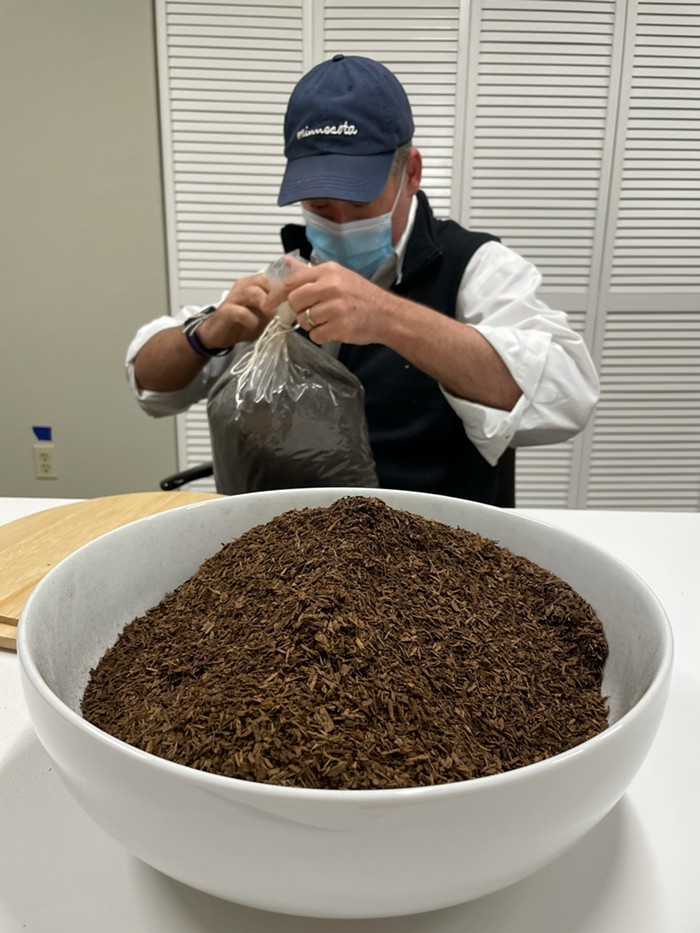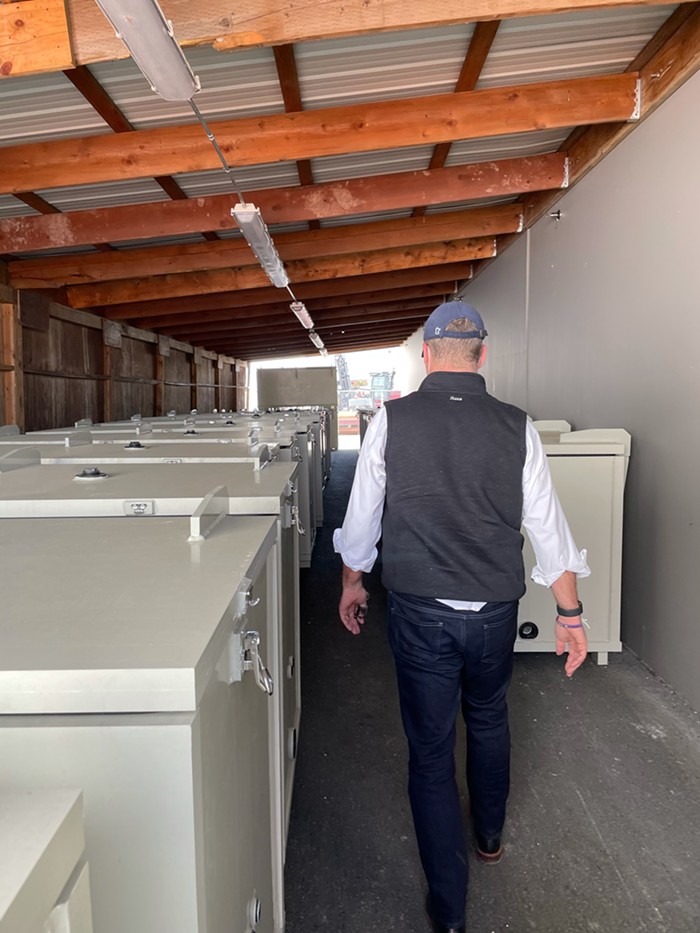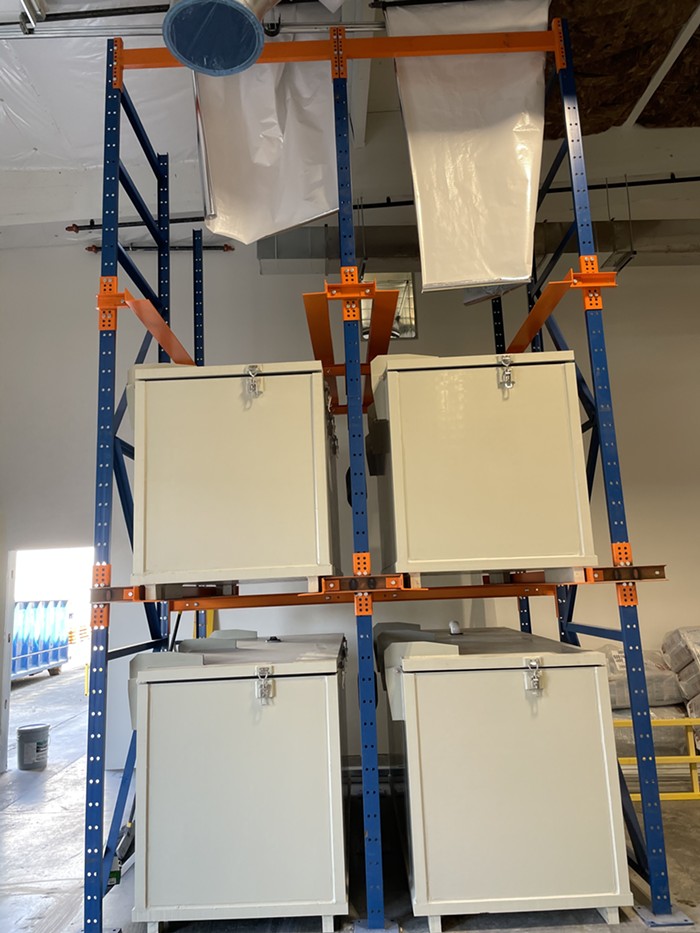"Human Composting Is Disrupting the Death Industry" by Nathalie Graham
Thanks to iowablackbird for contributing this article.
~~~~~~~~~~~~~~~~~~~~~~~~~~~~~~~
Human Composting Is Disrupting the Death Industry

When I arrived at the nondescript warehouse in Auburn, a team of construction workers was transforming the wide, empty space into a way station between this life and the next. This place was Return Home, the world's second-ever human composting facility. Once Return Home opens later this month, it will also be the largest.
In 2019, Gov. Jay Inslee greenlit legislation to allow people a third after-death option for their bodies. Instead of settling for being interred in a box or becoming charred dust in the wind, Washingtonians can now opt to be "terramated." That is, they can pack their corpses into sci-fi-like vessels filled to the brim with organic materials, and through a sped-up decomposition process become a truckload of fresh, tillable compost.

So far, Washington only has one facility like this. After designer Katrina Spade wrote her master's thesis in architecture on urban burial, she worked to make terramation a reality by sponsoring the 2019 legislation Inslee would ultimately sign. Spade now operates Kent-based Recompose, which opened last December with the capacity to compost bodies in 10 hexagonal vessels.
Soon-to-open Return Home will be able to compost 72 bodies, CEO Micah Truman told me. Unlike Spade, Truman doesn’t have a background in the funeral industry; he's an entrepreneur who previously worked in finance in China. When he first heard about the legislation, people in his life started expressing interest in being composted when they died. Truman knew Washington had just cracked open a burgeoning industry.
Legalizing terramation opened up the death and funeral industry to innovation. This is an industry that hasn’t changed in around 100 years, Rob Goff, executive director of the Washington State Funeral Directors Association told the Seattle Times back when the legislation passed in 2019. People are either buried, which is an expensive process that also leeches embalming toxins into the earth, or they're cremated, which is a cheaper option that spews fossil fuels into the atmosphere.
Currently, Washington is the only place in the world where composting human bodies is legal, but that's going to change. State legislatures in California, Oregon, and New York are attempting to legalize terramation this year. With Return Home, Truman said he was grabbing onto an industry that "looks like a small ripple" but is about to "blow up."
How to become dirt
When Truman first latched onto the idea of starting his own human composting company, the funeral industry didn't like him. He went to DeathCon, an annual convention in Washington for people in the death business, and people bristled. "The concern they had was, 'Here comes some guy from outside the industry with some weird technology,'" Truman said. They were afraid he would screw it up and leave the rest of the funeral industry to pick up the pieces. So, he doubled down on the science.
I sat across from Truman in a conference room next to the warehouse that would soon become home to a host of funeral workers, scientists, and an HVAC machine dubbed "octopus," which has 72 arms to connect each body-filled vessel to oxygen. Construction noises made the whole room shake. A big bowl of terramated soil sat in front of me. Was that… human?
“It’s pig,” Truman said, inviting me to smell the compost. It smelled like dirt. “We’ve been terramating pigs like fricking bananas, dozens and dozens of them.”
In order for Spade with Recompose to successfully advocate for her proposed terramation policy, she had to test the process. A research lab at Washington State University successfully tested the science on six humans who donated their bodies to science. Truman hasn't tested his process out on a human, but he's done it on plenty of pigs.
"If you can terramate a pig, you can terramate a person," he said.
The process with pigs and humans is mostly the same, he explained, talking with his hands. You put the body in one of the 72 vessels—which look more like long freezers than Spade's, which look readymade for deep-space hibernation—and pile in a four-to-one ratio of booking agent, a combination of sawdust, alfalfa, and straw. The body sits in there and heats up to 145 degrees to catalyze the natural microbial process. The vessel will stay at that temperature for three to 10 days. Moisture, heat, and oxygen speed up decomposition, and, after around two months, the body is compost.
Unlike a pig, with humans, at a late stage in the terramation process Return Home will need to fish out inorganic materials such as fillings and breast implants. They must also grind up teeth and bones, because those don't decompose.
"If there’s a god—and for this process, I believe that there is—she had this process figured out," Truman said, describing the microbes in the body that "transform us back to the earth."

In Truman's warehouse, the 72 vessels will be stacked on top of each other, and he'll need forklifts to move each vessel in-between the steps of the process. All of them will be connected to one of the HVAC system's arms.
People can pre-order a spot in a terramation vessel. They can reserve a space for whenever they kick the bucket, or for an already-dead person, or for someone who is about to die. The whole thing costs $4,950 and includes a death certificate, body transport, terramation, and compost delivery. One terramated body can yield enough compost to fill up a Ford F150, Truman said.
Even though Return Home isn't open yet, Truman has already fielded a bunch of orders. One old woman wanted her family to use her compost to make a bed of irises. His eyes misted over talking about the people who have inquired about terramation.
While Truman has strategically positioned himself to make a bundle "disrupting" the death industry, he's also realized the gravity of what his business means to vulnerable, grieving people.
"The thing that motivates me the most is we can’t mess this up," Truman said. "This is someone’s family member. We’re going to take that seriously."
A new kind of mourning
Unlike the quick turnaround of burials or cremations, terramation is a slow, gentle process. Truman isn't quite sure how that will change mourning.
One idea he had was to allow families to lay their loved ones in the Return Home vessel and have a small send-off there. Since everything in the vessel is broken down, families could choose to fill the vessel with anything biodegradable. He described a vessel filled with the deceased person's favorite foods, or a body encircled by countless flowers.
As he was talking, I thought of the painting Ophelia by John Everett Millais, wherein a drowning Ophelia lies adrift in a stream, pillowed by the current, surrounded by reeds, and draped in flowers. In that painting, nature is her coffin. Now that picture can be a structured, attainable reality for just under $5,000.
"You can put whatever you want in there and say goodbye to them in a way that feels good," Truman said. "I think that will matter."
The other part of the mourning process will happen when people receive the compost. Since the terramation process produces hundreds of pounds of dirt, people might not want to keep all of it. Instead, they can allow Return Home to use the compost in a new park Truman bought in Kent.
Return Home Park overlooks a creek and a greenbelt. The idea is to have a place where composted remains can yield lush vegetation. Yet, Truman doesn't want plaques or nameplates there. He doesn't want it to be a cemetery, but a park where anyone will want to visit.
The terramation legislation allows human compost to be scattered the same way cremated ashes are. People can put the compost anywhere in Washington so long as they have permission from a landowner or whoever is responsible for the land, like a ranger in a national park. Maybe people will choose to divvy up the compost and dole out the stuff by the bucketful to friends and relatives, Truman mused. Why not mix in a pinch of someone's memory with the topsoil on your next tomato crop?
Truman is expecting that his 72 vessels will fill up quickly since Recompose only offers 10 vessels.
"I think we’re going to see a real supply channel," Truman said. "We’ve worked very hard on our technology, and I think we’ve got it to a point where we have the ability to manage that type of scale. We think we have the ability to manage ten times that type of scale. It's crackers."
Source: The Stranger
~~~~~~~~~~~~~~~~~~~~~~~~~


Comments
Post a Comment